Few people are aware that when SBS television began in 1980, the date of 28 October had been discussed as a possible launch date. The new service was to be called Channel 0/28. The O from October and 28 from the date were thought good publicity. But that was a Tuesday night. Hardly a night to launch a new television channel. The previous Friday, 24 October was United Nations Day; a more appropriate day for the launch of the new TV station that was to specialise in ethnic and multicultural broadcasting. The service was the initiative of the Fraser government and was funded by the Commonwealth Government who established the then Independent and Multicultural Broadcasting Corporation – IMBC, (now SBS) to run Channel 0/28. The IMBC was the natural extension of the experiment started five years earlier under the Whitlam government in the establishment of the Sydney and Melbourne ethnic radio stations, 2EA and 3EA – Ethnic Australia (now SBS Radio).
On 28 October this year SBS celebrated 30 years of television and 35 of radio broadcasting. 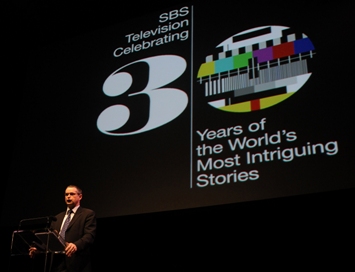 The celebration was held at the Fox studios in Sydney. Following welcome drinks and finger food, the evening’s meal was preceded by an official welcome to Country and acknowledgement of the Gadigal People of the Eora Nation. Soon after and in one of his finest speeches yet, the Minister responsible for SBS, Senator Stephen Conroy outlined the fascinating history of SBS – their story.
The celebration was held at the Fox studios in Sydney. Following welcome drinks and finger food, the evening’s meal was preceded by an official welcome to Country and acknowledgement of the Gadigal People of the Eora Nation. Soon after and in one of his finest speeches yet, the Minister responsible for SBS, Senator Stephen Conroy outlined the fascinating history of SBS – their story.
Senator Conroy’s speech
Good evening everyone, it’s a real pleasure to be here to mark this historic milestone for Australia’s very Special Broadcasting Service.
I’d like to acknowledge:
– Joe Skrzynski, SBS Chair
– Gerald Stone, SBS Deputy Chair
– SBS Board members both past and present
– Shaun Brown, Managing Director of SBS
– Senator Kate Lundy, Parliamentary Secretary for Immigration and Citizenship
– Julie Bishop, Deputy Leader of the Opposition
– Gladys Berejiklian, NSW Shadow Minister for Transport
– All SBS management and staff, both past and present
35 years ago, the Whitlam Government made a visionary decision to launch Government-funded radio services to assist new Australians to settle in to their new home.
Ethnic Affairs radio, as it was then known, was an essential service that allowed migrants to more easily find their way in a strange new land.
Its creation was a significant step away from the Australia of old, which had operated the notorious White Australia Policy, to a new and inclusive nation that welcomed people from all over the world.
The creation of what was known as “ethnic” television five years later, by the Government of Malcolm Fraser, was a continuation and expansion of this important step.
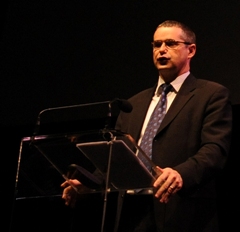
It demonstrated a bi-partisan commitment to a multicultural Australia, and led to the creation of the Special Broadcasting Service to manage both radio and television services for Australians from culturally and linguistically diverse backgrounds.
From its earliest focus on providing services for newly arrived migrants, SBS’s vision was expanded in the 1980s and 1990s to one of promoting the benefits of cultural diversity to all Australians.
In doing so, SBS grew to be a broadcaster that has hugely enriched our national culture, changing the very nature of Australian society – and always for the better.
On a fraction of the budget of the average broadcaster, SBS now provides a truly breathtaking range of services – services which contribute far more than just entertainment to Australia.
And I’m not just talking about the World Cup – although this year’s coverage of that all important tournament was arguably the finest and most comprehensive in the world!
SBS now broadcasts two free-to-air TV channels, operates two subscription TV channels, and runs four radio networks in 68 languages.
Its programs reflect the real, “lived” diversity of Australian society, more so than any other broadcaster, including the ABC.
And, in this digital age, SBS also provides online services that reflect and celebrate the strength of Australia’s cultural diversity and social harmony.
30 years ago Australia was very fortunate to see the establishment of a broadcaster that is very special indeed – in fact, unique in the world.
Over the last three decades, SBS has had an undeniable impact on Australia, promoting a more inclusive and yet outward looking society, one which has built on the great strengths of its increasingly diverse citizenry.
An Australia without SBS is now unimaginable.
Congratulations to all involved with SBS, both past and present, on reaching this important milestone.
Happy Birthday, and here’s to the next 30 years.
Other speeches were given that evening while a five course multicultural feast was served. Guests watched live performances from various cultures and projected video of SBS’s past achievements and history.
Later, the Chairman of SBS, Joe Skrzynski continued the SBS story and spoke of the future.
Joe Skrzynski’s speech
Tonight is a celebration, and I trust you will enjoy seeing, hearing and tasting from our multicultural buffet. 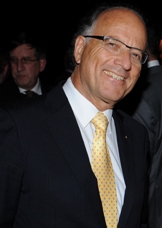 At the same time it is important to reflect on such an occasion as to how we are fulfilling our mission, and how we think of the future. The context for SBS is that Australia is a new world multicultural society, absorbing successive waves of migrants from different countries. SBS was created to welcome and support them, and to inform and educate them in their own languages and in English about Australia, and at the same time inform, educate and entertain all Australians so that they better understand and value cultural diversity at home and abroad.
At the same time it is important to reflect on such an occasion as to how we are fulfilling our mission, and how we think of the future. The context for SBS is that Australia is a new world multicultural society, absorbing successive waves of migrants from different countries. SBS was created to welcome and support them, and to inform and educate them in their own languages and in English about Australia, and at the same time inform, educate and entertain all Australians so that they better understand and value cultural diversity at home and abroad.
From humble beginnings, with coverage of eight languages on radio with limited coverage, SBS has grown to be a national broadcaster, broadcasting in 68 languages weekly on radio, reaching about 40% of Australians each week across two free-to-air channels, in addition to World Movies and STVDIO on subscription television, and over a million visits a month across our websites in English and in 68 other languages.
It is indisputably not only Australia’s, but the world’s most distinctive and diverse broadcaster, and has been a potent factor in making Australia a cosmopolitan society in a rapidly globalising world.
It has garnered numerous international and national awards for its programs along the way, including an Academy Award, and this year the majority of the peer group awarded Logies — and, just last night, 8 nominations for the AFI.
Now the success of Australia as a multicultural society could lead some to think that SBS is “mission accomplished”. They would be wrong. Today there are more than 3 million, or twice as many Australians as in 1975, who speak a language other than English at home, and the diversity of race, religion and cultures has multiplied among newer arrivals, so that the mission has in fact expanded, quantitatively and qualitatively!
Technology has presented fresh challenges. Global satellite distribution and cheap home receivers mean many, especially newer migrants, can and do tune into home country broadcasts to the virtual exclusion of English language Australian media, posing the risk of them falling into “media ghettoes”, where their principal source of knowledge about Australia is through the eyes of their old country media. Our surveys show that they distrust mainstream Australian media, other than SBS.
So the need for SBS “in language” and English services is greater than ever. The cohesion of our multicultural society cannot be taken for granted. It is a work in progress, and requires continuing and sophisticated government programs, including a vigorous SBS to ensure its success.
In recognition of these enormous social and technological changes impacting upon our services and industry, we recently re examined the organisation’s strategic direction and reshaped SBS’s Corporate Plan.
The plan outlines our ambitions for the future, and explicitly states that the role of SBS is to contribute to social inclusion in Australia.
Our aim is to be a vital factor in the harmonious integration of migrants into Australian society, whilst valuing their distinctiveness; to be a catalyst for the nation’s conversation about multiculturalism — informing and educating all Australians so as to promote harmony and enable us to minimise friction and maximise the benefits of the skills, cultural and linguistic richness and global networks of our diverse migrant communities.
The strategies to do this are based on creatively exploiting new technologies. Digital TV has tripled the channel capacity of SBS TV. This resolves the dilemma of the past, whereby with just one channel, English language programming of broad appeal across all communities competed with niche “in language” programs in prime time.
Across all its TV channels, SBS will be able to be both broad and distinctive, with much more “in language” programming.
Another new strategy which I can announce tonight sees the further development of SBS “on demand” services to pilot Virtual Community Centres for individual language groups. These will be the “go to” media destination for those communities, providing on-demand access to SBS TV and radio programs, additional on line content specially commissioned or acquired, links to community and government services information and, a first for SBS, user generated content from the individual community itself.
The first of these Virtual Community Centres will be for Australian Chinese speaking communities, and will be launched next month, including the pilot of an Australian-Mandarin language news service. This will be a first for Australian television — a domestic in-language news service. We have had in-language Australian news on radio, but now will pilot extending that to television.
But some things will not change, notably our commitment to drama and documentaries that reflect the reality of our multicultural society in a way that other broadcasters simply do not. This means more programs like the award winning East West 101, The Circuit and First Australians.
So, this is the anniversary vision for SBS incorporated in its new corporate plan. It will be implemented progressively as funding permits.
On behalf of SBS, thank you for being part of the story so far, and welcome to the next exciting episode of SBS, six billion stories and counting.
Listening to the speeches (above) were the 300 guests that SBS had invited to their birthday celebrations. 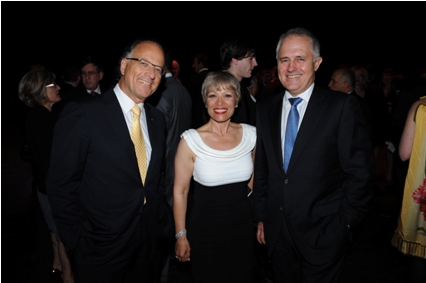
The night was attended by dignitaries, representatives from various ethnic community groups, as well as current and past on-air presenters and others associated with SBS.
SBS-Chairman, Joe Skrzynski with Majida Abboud from SBS Radio and Malcolm Turnbull, Shadow Communications Minister (pictured) at the SBS 30th/35th birthday party held in Sydney on 28 October 2010.
The food delights for the evening were created by Yaama Dhiyaan, (the welcome sharing plate); Guillaume Brahimi (first course); Luke Nguyen (second course); Sean Connolly (third course); Adriano Zumbo (dessert).
Luke Nguyen is well known to SBS viewers for his Vietnam series while Sean Connolly introduced viewers to multicultural families across Australia in My Family Feast. In 2011, Guillaume Brahimi will present a French Food Safari on SBS-TV and Adriano Zumbo will take viewers behind the scenes in his kitchen. 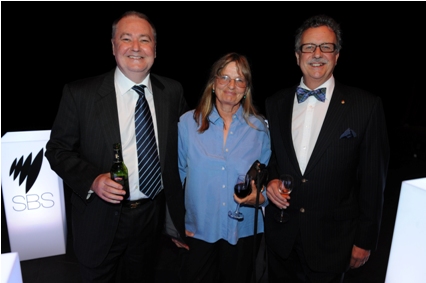
Also attending the SBS 30th/35th birthday party was the SBS Managing Director, Shaun Brown with Liz Courtney and former SBS MD, Nigel Milan (pictured).
A separate party was held at another time for current employees of SBS who were not able to attend the birthday celebrations at Fox studios.
Many changes have occurred since multicultural broadcasting commenced. No other broadcaster in the world exists like SBS. For more information about the history of Australia’s multicultural broadcaster see the TelevisionAu.com – Channel 0/28 website, the Wikipedia – Special Broadcasting Service website and the SBS website. Also of interest Clare Dunne who pioneered multicultural broadcasting. Other information about SBS is on the SaveOurSBS.org website.
